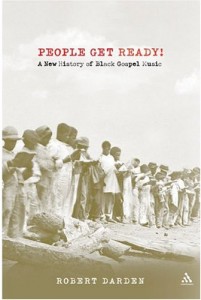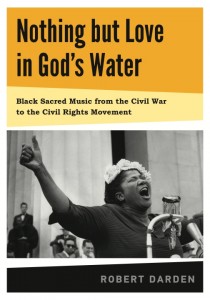Today’s guest blogger is Robert Darden, journalism professor at Baylor University, author of Nothing but Love in God’s Water: Black Sacred Music from the Civil War to the Civil Rights Movement and People Get Ready: A New History of Black Gospel Music, founder of the Black Gospel Music Restoration Project, subject of A Life’s Work, and all around great guy.
A year later, I must confess, I’m still a little bewildered as to why David wanted to include me in A Life’s Work. As I’ve read about (and watched the videos of) the other people featured in this documentary, I think of myself as something of a fraud.
It seems to me that those other people are doing larger than life work, epic work, generation-spanning work. Work that entails a great deal of personal (and financial) sacrifice.
Honestly, I don’t know that I’ve sacrificed all that much. I’ve spent a little of my own money. I’ve spent a little more of my own time. But this is money and time I would have spent even if the Black Gospel Music Restoration Project hadn’t been founded through the generosity of Charles Royce. I just like this stuff.

OK, I really, really like this stuff.
This music matters to me. I’m egocentric enough that it doesn’t really matter to me if it matters so much to anyone else. I’d do it if no one else was interested, if no one else thought it was important.
It’s great that other people do love this music (and the artists who created it). It deserves to be loved, in my opinion. But that’s not why I got so involved (read: enmeshed) in it. It’s just what I did.
I’m not a terribly introspective guy. Even as guys go. Sometimes I think I got into this “rescue” business because I’m just a shameless fan boy.
There is a great quote from Catcher in the Rye that kind of sums up my approach here:
“What really knocks me out is a book, when you’re all done reading it, you wished the author that wrote it was a terrific friend of yours and you could call him up on the phone whenever you felt like it.” — Holden Caufield
Maybe I just want to hang with and talk to the great gospel artists who are still around – Joe Ligon, Inez Andrews, Jessy Dixon, the Pillars and all of the others.

That’s the selfish side of me. I want them to like me.
But there’s another side of me, the better side of me. That side of me is more aligned with Kenneth Rexroth:
“Against the ruin of the world, there is only one defense: the creative act.”
I’m not all that smart, but I am smart enough to recognize the creative act, the genius, the transcendent.
And that’s what I think most black gospel music is. Transcendent. It deserves to be celebrated.
But first it has to be preserved.
Both the selfish and the unselfish sides of me are always there … the sacred and the profane are, of course, part and parcel of all of us.
In the end, I believe saving black gospel music’s recorded legacy is a holy quest.
And, fortunately, God can even use flawed and damaged people like me.
